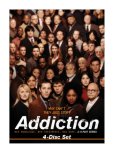| Reviews & Columns |
|
Reviews DVD TV on DVD Blu-ray 4K UHD International DVDs In Theaters Reviews by Studio Video Games Features Collector Series DVDs Easter Egg Database Interviews DVD Talk Radio Feature Articles Columns Anime Talk DVD Savant Horror DVDs The M.O.D. Squad Art House HD Talk Silent DVD
|
DVD Talk Forum |
|
|
| Resources |
|
DVD Price Search Customer Service #'s RCE Info Links |
|
Columns
|
|
|
Addiction
THE MOVIE:
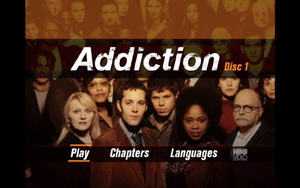
We've all seen movies that romanticize drug addiction, that show the wild ups and downs of abuse. Most of these movies end at the recovery stage, where the junkie cleans him or herself up and moves on to a brighter day. In a lot of cases, the crazy behavior that precedes the recovery completely overshadows the detox and 12-stepping that is supposed to be the film's "message." There are also films that are only about recovery, where through confession and tough-love hugging-it-out, the addict ends up clean and sober.
Well, HBO has made the multi-pronged Addiction series to let you know that all of that is bunk. Billed as a multi-media project, Addiction gathers together notable documentary filmmakers to create a new and unvarnished look at what causes addiction to drugs and alcohol and what real treatment entails. It's an informative portrait of a struggle within our nation to understand the grip these substances have on our friends and loved ones and why the accepted notion of hitting rock bottom and kicking the habit doesn't work. Trainspotting this ain't, and Sandra Bullock definitely isn't going to find love at the end.
The core of Addiction is a 90-minute film made up of nine separate parts that are all interconnected by interviews with six of the leading doctors and researchers in addiction treatment. Of those parts, half of them are about the lifestyle of addiction (families struggling with younger addicts, a labor union's approach to helping their own, crusades against insurance companies) and levels of medical response (dealing with drug-related injuries in an emergency room, advances in brain imaging and medicinal therapy). These nine films are:
* "Saturday Night in a Dallas ER," directed by Jon Alpert (Baghdad ER)
* "A Mother's Desperation," dir. Susan Froemke (Christo in Paris) and Albert Maysles (Grey Gardens)
* "The Science of Relapse," dir. Eugene Jarecki (Why We Fight) and Susan Froemke
* "The Adolescent Addict," dir. Kate Davis (Southern Comfort) and David Heilbroner (Pucker Up)
* "Brain Imaging," dir. Liz Garbus (The Execution of Wanda Jean)
* "Opiate Addiction: A New Medication," dir. D.A. Pennebaker (Bob Dylan: Don't Look Back) and Chris Hegedus (Startup.com)
* "Topiramate: A New Clinical Trial," dir. Alan Raymond (An American Family)
* "Steamfitters Local Union 638," dir. Barbara Kopple (Harlan County U.S.A.)
* "Insurance Woes," dir. Susan Froemke
Though the filmmakers never say it outright, the main goal of this project is to change how we perceive addictions and addicts. You're not going to see any street junkies or dealers in Addiction. Rather, the people you are going to see are the ones who mainly pass through life without everyone knowing they have a problem. For the most part, they look normal and healthy. They may have ruined their lives in pursuit of their drug of choice (just as many of those looked at are drinking as much as they are shooting up), but they could be your neighbors, your friends, or even your children. It's much easier to judge someone who looks like they are tweaked out, who lives on the street and fits our image of an out-of-control user; it's much harder to instantly dismiss a high school student who doesn't know how to cope or a retired man who only just realized he was boozing his life away. It's an issue that affects us all, and the sooner we deal with the stigma of disease, the better.
The rest of the segments concentrate on showing us that addiction is a disease like any other. Myths like "hitting rock bottom" are quickly dispelled with, as are any glossy ideas we might have about the assured success of any rehab program. As one doctor explains, with any other chronic condition, we accept that there are good days and bad days as far as the sick person's health is concerned. Similarly, we should accept that relapses are to be expected. Current study is focusing on looking at how addiction affects the brain, both physically and psychologically. Brain imaging can show us how extended drug use can alter the map of our mind, and from there, doctors are studying how this affects the behavior of an addict. A strong case is made for how a user's ability to choose for himself is distorted by the prolonged influence of his habit. Similarly, the need to manage one's needs via medication is examined in detail. Addicts need to rebuild elements of their brain that the drugs have supplanted, and getting through that is not a simple matter of going cold turkey.
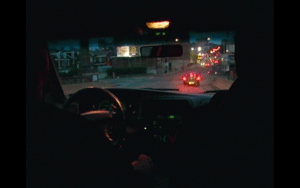
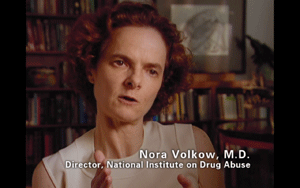
This 90-minute version of Addiction is very effective, shuffling up the personal and the technical to show us all the behavior, both the consequences and the solutions, without being preachy or overly teachy. Even when showing a mother working with the cops to have her own child arrested, the filmmakers don't play the sentimentality card too heavily. The bare facts are more than enough. One of the more stirring stories is Kopple's "Steamfitters Local Union 638." It's the best object lesson for the need of a multi-faceted treatment program where peer support is one of the most important pieces of the recovery puzzle. Steamfitters are the men who install heating and cooling units into buildings, no small task when you're talking about decking out skyscrapers and other super structures. These are tough guys who have a tradition of self-medication. Older steamfitters talk about starting out on the job when it was acceptable to drink while at work. Realizing they had a problem within their organization, this union set up a program in which they help themselves. As a brotherhood, they band together and take care of their own.
What works about the core program is its focus. We get the information in capsule form, the interlocking stories detailing the different aspects of a complex issue. The problem with Addiction comes when the filmmakers open it up for the "multi-media" presentation. The 90-minute film, which in this 4-DVD set is disc 1, aired on HBO earlier this year; from there, viewers could watch 13 more supplemental films on either the "On Demand" HBO channel or the network's website. (Since these were all films, I'm not sure it qualifies as multi-media, but since there was also a companion book available, we'll let the descriptive stand.) Every segment of the film ends with a pointer to either another program on one of the bonus DVDs or to HBO.com, so even as your absorbing the documentary, you realize that you're not getting the full scoop.
DVDs 2 and 4 contain more of the full documentary shorts. Some of them are expanded versions of what was in the main film (more time with the various adolescent addicts, for instance) and others stand completely apart (a look at a "drug court" in South Boston). These are still really good, but I immediately started to wonder, why create a distilled, central version of the overall project instead of a longer series with segments that are more in-depth and maintain the intended mission? There are five hours worth of supplements on these DVDs, and not only does it feel like a bit much after a while, it also starts to lose its effectiveness. Short films about specific treatment programs come off more as infomercials than news documentaries. DVD 3 is exclusively extended interviews with the medical professionals who participated in Addiction. These are just the sit-downs shown without any extraneous footage, and by the time you reach them, you've already heard a lot of the soundbites two or three times on DVDs 1 and 2, and you'll hear many of them again on DVD 4.
All of the information is good, but it starts to be overkill. The program loses its outside interest for a viewer like myself, and it ends up being more like a guide to seeking treatment for the addicted and their families. Which would be fine if that was what Addiction was designed to be, but since it is presented as a series of investigations to inform the public at large about the realities of drug abuse, it seems to me Addiction would have been much better served as a cohesive show that moves in precise, considered steps rather than presented as a buffet spread out over various formats. The material is all there, but it seems like somewhere along the way those involved got too caught up in making Addiction an "event" rather than sticking to a course that would get this series to the most people in the best possible way.
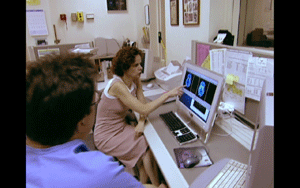

THE DVD
Video:
Addiction was shot in full frame for television. The image is as clean and fresh as the day it was born, nicely ported over to DVD with no noticeable issues with artifacting or any other digital bugaboos.
Sound:
A strong English 2.0 mix keeps all the sound coming through clear, including the live documentary footage recorded on the fly in various locations by multiple filmmakers. There is also a Spanish-language track.
Extras:
As noted in the main review, all of DVDs 2, 3, and 4 are bonus features. The bulk of the Addiction program is supplemental materials, which as I also noted, is part of its problem.
The four discs come in regular two-tray DVD cases housed in a cardboard slipcase. A twelve-page booklet is also included. It gives a rundown of the various series elements, including a guide to the different segments and the participants. There are also a couple of pages of bullet points summarizing important aspects of the addiction issue.
FINAL THOUGHTS:
Rent It. Addiction is an illuminating examination of the problem of drug and alcohol abuse in America. It definitely has given me much to think about in terms of my preconceived image of people with drug problems and what I thought I knew about what it takes to kick the habit. When it comes to having a lot of information about the study of addiction as a disease and how we can treat it, I am not sure there is a more succinct resource material than this DVD set; however, as a documentary for consumption by a regular viewer not looking to do a study on drug abuse or seeking advice on how to get help, the multi-pronged program is too sprawling. Rather than distilling everything down to one 90-minute feature and then stretching the remaining material over five hours of supplements, Addiction would have been better as a single series of films tackling the different ideas one by one.

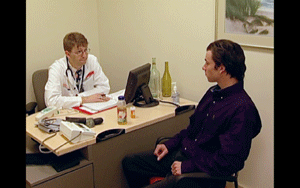
Jamie S. Rich is a novelist and comic book writer. He is best known for his collaborations with Joelle Jones, including the hardboiled crime comic book You Have Killed Me, the challenging romance 12 Reasons Why I Love Her, and the 2007 prose novel Have You Seen the Horizon Lately?, for which Jones did the cover. All three were published by Oni Press. His most recent projects include the futuristic romance A Boy and a Girl with Natalie Nourigat; Archer Coe and the Thousand Natural Shocks, a loopy crime tale drawn by Dan Christensen; and the horror miniseries Madame Frankenstein, a collaboration with Megan Levens. Follow Rich's blog at Confessions123.com.
|
| Popular Reviews |
| Sponsored Links |
|
|
| Sponsored Links |
|
|
| Release List | Reviews | Shop | Newsletter | Forum | DVD Giveaways | Blu-Ray | Advertise |
|
Copyright 2024 DVDTalk.com All Rights Reserved. Legal Info, Privacy Policy, Terms of Use,
Manage Preferences,
Your Privacy Choices | |||||||









